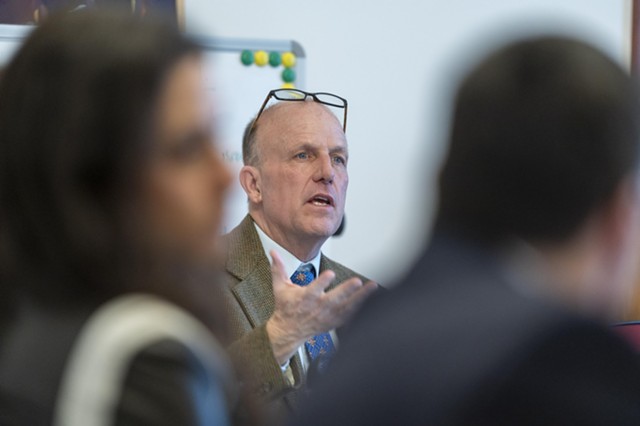
- File: Jeb Wallace Brodeur ©️ Seven Days
- Rep. Peter Conlon (D-Cornwall)
As the legislature races to figure out how to reduce education spending and bring down homestead property taxes, lawmakers and school leaders have started contemplating complex, emotionally charged questions about the future of education in Vermont.
In the House Education Committee on Thursday, representatives from the Vermont School Boards Association and Vermont Superintendents Association gave frank testimony about education spending and longer-term strategies that could address major cost drivers.
Some of the discussion focused on more dry and technical solutions — such as restructuring the statewide negotiation process for school employees’ health insurance or creating an oversight board to monitor the state’s roughly $2 billion Education Fund.
But at the heart of the hearing was the weighty realization that the state is at a critical crossroads, and bold action will be necessary to create a more sustainable and affordable education system.
The discussion veered into thorny territory, from grappling with the acute, growing mental health needs of students to the feasibility of continuing to operate the state’s many small schools.
“Vermont is challenged by the fact that we have a foot in the past and a foot in the future,” said Jeff Francis, executive director of the superintendents' association. “We’ve really wanted to hang on to small schools as the center of every community and, at the same time, make sure that we have robust opportunity for every child in the state.”
Related Senate Passes Education Funding Bill, Which Heads to the Governor

Montpelier Roxbury Public School District superintendent Libby Bonesteel provided one example. In her district, Roxbury Village School has 13 full-time staff for just 42 students. From an operational standpoint, it would be easy to close the school and bring those students to Montpelier’s Union Elementary without any additional costs, Bonesteel said. But it’s not a decision school board members can make quickly or unilaterally because of how important the school is to members of the Roxbury community.
School boards “need legislators’ help and support and backing when they come to a community with a decision that might be hard,” Bonesteel said.
Rep. Peter Conlon (D-Cornwall), chair of the House Education Committee, called closing small schools “the issue where the rubber meets the road.”
“It’s incredibly difficult because that is not what the voters want,” he said. “As I used to say when I was head of our school board, we are trying to drag a populace that wants a 19th-century system into the 21st century.”
Student mental health, and how those services are funded, was also front and center. A spike in mental health challenges is one of administrators’ top concerns and has put pressure on school budgets because of the increased services districts must provide, said Sonya Spaulding, a board member in the Barre Unified Union School District.
There are staff shortages at community mental health agencies, and alternative schools have long wait lists. That means schools are trying to meet students' needs in-house, Spaulding said, which requires hiring additional social workers and counselors.
Bonesteel said most districts in the state, including hers, are now offering alternative programs for students whose behavioral and mental health challenges make it impossible for them to be in a traditional classroom. She said her district doubled its spending on social-emotional and mental health services in the past three years, from $1.5 million to $3 million. It's yielded positive results, including a reduction in hazing, harassment and bullying investigations, and suspensions. But those results come with a price.
“We need high-quality staff to help these kids with what their needs are,” Bonesteel said.
Related Two School Districts Create Their Own Programs for Students With Special Needs

Also discussed on Thursday: the strain Vermont's universal school meals and PCB testing programs are putting on the ed fund, the possibility of creating statewide class-size requirements, and the lack of leadership from the Agency of Education.
“I think we have to have political will right now for the future of the system,” sad Rep. Erin Brady (D-Williston), vice chair of the House Education Committee. “Some of it is decisions we just don’t want to make — and we have to start making them.”
"It’s also important to note the projected spending increase this year is $243 million, so even if every single school board makes adjustments to their budget, we’re unlikely to avoid significant property tax increases," the governor wrote. "And we should not ignore how difficult the choices that some communities will have to make around staffing, program offerings, and services."














Comments
Comments are closed.
From 2014-2020, Seven Days allowed readers to comment on all stories posted on our website. While we've appreciated the suggestions and insights, right now Seven Days is prioritizing our core mission — producing high-quality, responsible local journalism — over moderating online debates between readers.
To criticize, correct or praise our reporting, please send us a letter to the editor or send us a tip. We’ll check it out and report the results.
Online comments may return when we have better tech tools for managing them. Thanks for reading.